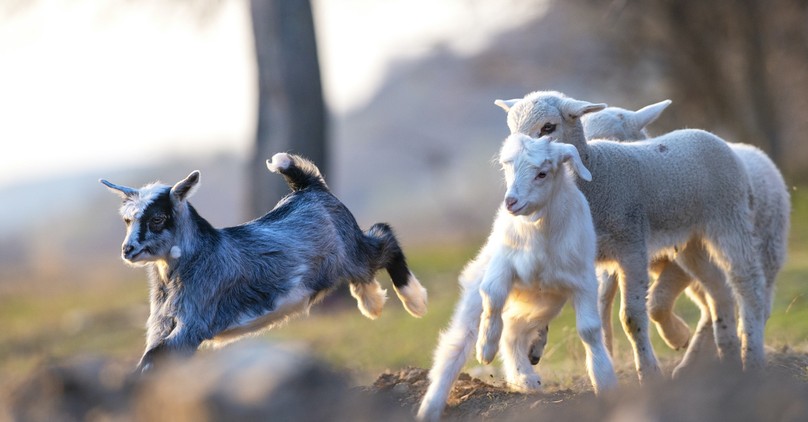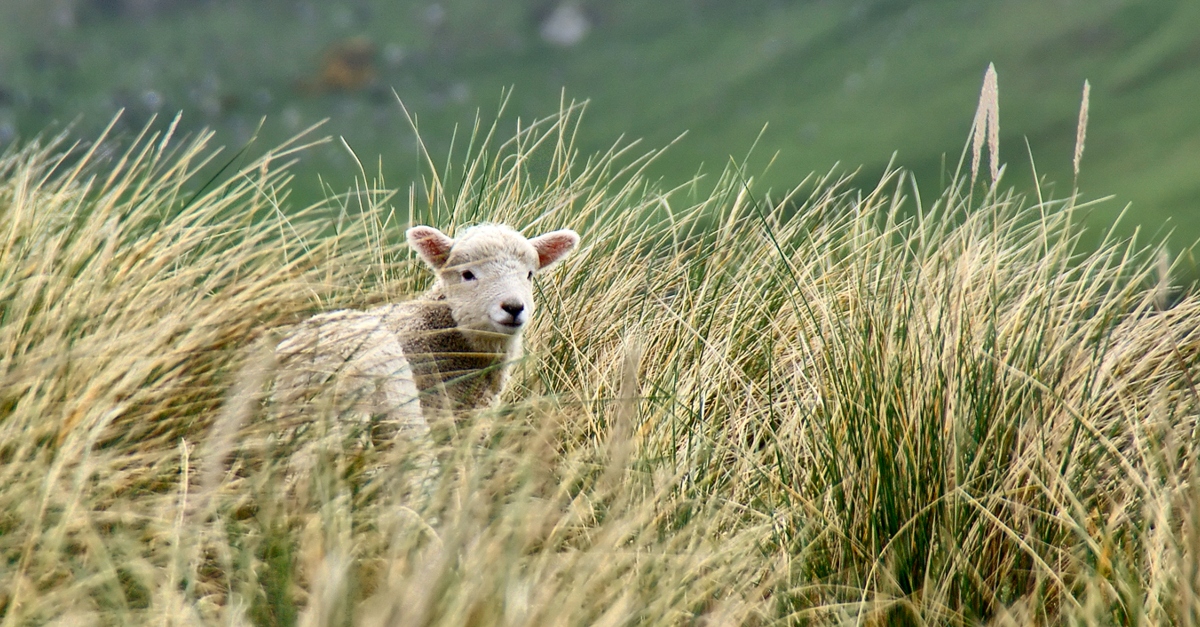
I must confess that my first exposure to the concept of sheep and goats and their eternal destiny comes from an alternative rock band, Cake, instead of the Bible. Their song, Sheep Go to Heaven, is a somewhat satirical way of saying that those who mindlessly follow the crowd go to heaven, while those who are able to think for themselves end up going to hell.
This concept doesn’t come from a 90’s band but rather from Jesus’ parable in Matthew 25:31-46. And we find there that it’s meaning isn’t about mindlessly following the crowd, but rather dedication to Jesus and the life that it engenders.
What Is the Context of This Parable?
Matthew 23 ends with Jesus’ lamenting over Jerusalem as he enters the city. Matthew 26 begins the events of the passion. Matthew 24-25 is the fifth discourse in the gospel of Matthew. It is here that Jesus speaks of the coming kingdom.
Matthew 25 in particular gives three illustrations of the separation between one group and another. In Matthew 25:1-13 we see five foolish virgins and five wise virgins. They are separated by a certain action. Likewise, in Matthew 25:14-30 we read of good and faithful servants versus the wicked servant who buried his talent. Matthew 25:31-46 follows the same pattern as the previous illustrations. Here the sheep and goats are separated by their actions, or lack thereof.
The entire discourse of Matthew 24-25 seems to be given to only his disciples. But there is probably a much broader term than “the twelve.” This would likely include some who will turn away from following Christ. The point to all of the disciples is that following Jesus leads to specific actions. And these specific actions reveal which category you belong to.
What Happens in the Parable of the Sheep and the Goats?
The process of separating sheep from goats would have been familiar to Jesus’ audience. Here Jesus uses this common practice to make a point about all of humanity being divided. In the parable of the ten virgins, the separation comes based upon whether or not they are properly waiting for the bridegroom. In the parable of the talents, the separation comes from whether or not the servants were good stewards. Here the separation comes from whether or not they have served “the least of these.”
Particularly, the action is feeding when hungry, giving a drink when thirsty, inviting in the stranger, clothing the naked, visiting those who are sick and in prison. Those who failed to do these actions are told to depart from Jesus into the fire prepared for the devil and his angels.
But there is an interesting detail in this parable that we can easily miss. Both the sheep and the goats seemed surprised by their fate. The sheep didn’t realize it was “Jesus” that they were providing for. Likewise, the goats did not know it was “Jesus” they were rejecting. This, I believe, is the key to properly understanding this passage. They are not sheep because they do these good deeds or goats because they fail to do these good deeds, but rather their doing of the good, or failing to do the good, is precisely because of their character. Wise virgins wait. Good servants serve. Sheep serve. That’s the point of Jesus’ teaching here.
4 Things We Learn from This Parable

Photo credit: ©Getty Images/Joaquin Corbalan
1. The “Least of These” Matter
There is some debate about who the “least of these” actually are. Is this referring to how one treats all believers or vulnerable missionaries? Or is this referring to how one responds to the poor and needy in general? Some have even interpreted this as having a Jewish and Gentile distinction.
Personally, I think it best not to read too much into this text. Some try to find details about the final judgment based on Jesus’ use of ethnos in verse 32. Others point to verse 40 when Jesus says “these my brothers” and believe that to be synonymous with “the least of these” in verse 45. Certainly, the way believers are treated is a marker of fidelity to Christ. This is much of the argument of 1 John. And it is what Jesus also said in John 13:35.
But I also believe that Jesus very much identifies with the broken and hurting. He identifies with the vulnerable. We do great injustice to the text, in my opinion, when we turn “the poor” into the “spiritually poor” and neglect much of what is meant by those phrases in the Old Testament. I think the major point here is that the heart of those who are sheep is to respond to the vulnerable. And you are especially motivated when the vulnerable one is a brother or sister in Christ.
2. There Is a Separation
Regardless of how you parse out the details in this passage, there is one thing that is certain — there is a separation between sheep and goats. And that separation has eternal consequences. That is the point that Jesus is making with each of these illustrations. How we respond to Jesus matters for eternity.
In this sense, that Cake song is correct. Sheep go to heaven and goats go to hell. But it doesn’t have anything to do with mindlessly following the crowd. It has to do with having a heart changed (“my sheep hear my voice”) and thus responding to the path of Jesus. To not follow the way of Jesus will have eternal consequences.
3. It’s Not about Sheep and Goats
This will come as quite the let down to preachers, like myself, who have made a big deal about the difference between sheep and goats. Yes, there are differences in the way that sheep act and how goats act. Yes, there is an independent spirit in goats. And it is true that believers are often likened to sheep. Jesus loves the shepherd metaphor.
But this text isn’t about the difference between sheep and goats. They are stock images. They aren’t blessed because they act like sheep whereas others act like goats. The point is that one group inherits the kingdom, and the other group does not inherit the kingdom. That is the point of each of these illustrations. So, to make this about the different characteristics of these animals imposes a foreign meaning onto the text.
4. What We Do Matters
Many commentaries spend an inordinate amount of time explaining how these verses square with the doctrine of justification by faith. I understand that impulse. It appears on first glance that this text is teaching that sheep are justified because they took care of the vulnerable, whereas the goats are cast into hell because they lacked the compassionate heart of Jesus in caring for the vulnerable. And so, it appears on the surface that this is teaching justification by works.
The point, though, of all these illustrations is that there is a marked difference between those who are in Christ and those who are not. This is part of why Jesus is weeping over Jerusalem in Matthew 23. They have rejected him. They have rejected his path. And this rejection is clear by the way they respond to the vulnerable. It is not their actions which cause them to be rejected as much as their actions are a demonstration of their prior rejection of Jesus.
What we do matters. It matters because what we do is a reflection of what we really believe. We cannot say that we follow Jesus and then walk a path different than what he would walk. And when we do follow Jesus, we find ourselves rather surprised that the things we do by instinct now (like caring for the vulnerable) is actually a reflection of our love for Jesus.
Charles Spurgeon summarizes well:
“When they stand before the judgment-seat, the bare idea of there being any excellence in what they have done will be new to the saints, for they have formed a very lowly estimate of their own performances, and what they have done seems to them too faulty to be commended. The saints fed the hungry and clothed the naked because it gave them much pleasure to do so. They did it because they could not help doing it, their new nature impelled them to it. They did it because it was their delight to do good, and was as much their element as water for a fish or the air for a bird. They did good for Christ’s sake, because it was the sweetest thing in the world to do anything for Jesus.
Source
C. H. Spurgeon, “The Final Separation,” in The Metropolitan Tabernacle Pulpit Sermons, vol. 21 (London: Passmore & Alabaster, 1875), 287–288.
Photo credit: ©Getty Images/Tutye
Mike Leake is husband to Nikki and father to Isaiah and Hannah. He is also the lead pastor at Calvary of Neosho, MO. Mike is the author of Torn to Heal and Jesus Is All You Need. His writing home is https://mikeleake.net and you can connect with him on Twitter @mikeleake. Mike has a new writing project at Proverbs4Today.


